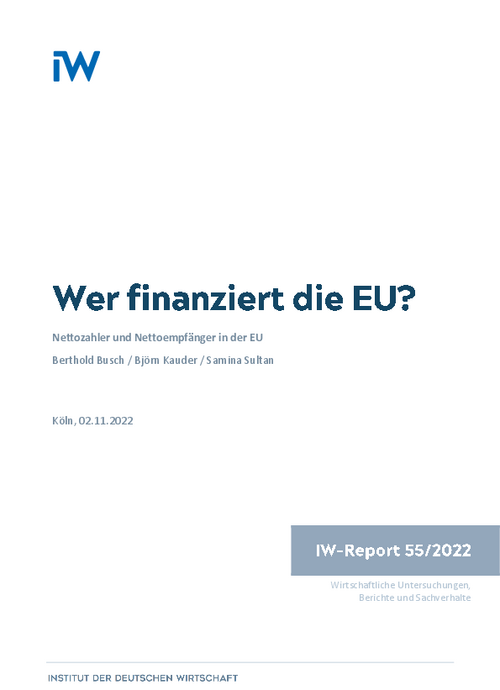The European Union finances its budget largely from contributions by the Member States. Since, in turn, substantial payments are made in the Member States via the expenditures of the EU budget, this results in net positions for the individual countries vis-à-vis the EU budget.

Who finances the EU?: Net contributors and net recipients in the EU

The European Union finances its budget largely from contributions by the Member States. Since, in turn, substantial payments are made in the Member States via the expenditures of the EU budget, this results in net positions for the individual countries vis-à-vis the EU budget.
Although the financial flows between the Member States and the EU budget represent only a part of EU policy, they are nevertheless a particularly important one. There are various ways of calculating the net position. In the following, this report uses the method of the European Commission, which excludes customs revenues on the revenue side and administrative expenditures on the expenditure side. Accordingly, in 2021 ten states paid more into the EU budget than they received from it; they were thus net contributors. 17 states were net recipients. If we first compare the absolute amounts, we see that Germany was the largest net contributor in 2021 with an amount of 21.4 billion euros. It is followed by France with 10.9 billion euros and the Netherlands with just under 4.1 billion euros. The top 5 are rounded out by Sweden (EUR 2.5 billion) and Denmark (around EUR 1.5 billion). In terms of net recipients, Poland leads with EUR 12.9 billion. It is followed by Greece with EUR 4.7 billion and Hungary with EUR 4.3 billion. Romania (EUR 4.2 billion) and Spain (EUR 3.5 billion) take the other places. Looking at the net positions relative to gross national income (GNI), the picture shifts somewhat. However, the largest net contributor remains Germany, which contributes 0.58 percent of GNI. It is followed by the Netherlands with 0.48 percent, Sweden with 0.46 percent and France and Denmark with 0.43 percent each. In terms of net recipients, Croatia leads the way with 3.08 percent of GNI. It is followed by Lithuania and Hungary with 3.05 and 2.89 percent, respectively. Bulgaria (2.84 percent) and Latvia (2.76 percent) are next in line.
Unlike in the past, the European Commission itself no longer publishes the net positions by Member States. Irrespective of the debate about the appropriateness of the net contribution of the Member States, it is advisable that the EU officially reports the net positions again in the future. This is necessary for reasons of transparency, not least because it involves the use of tax revenues. Publication of the net positions by the European Commission itself would give these figures an official seal and thus counteract arbitrary calculations and distorted or Eurosceptic representations. Moreover, this would by no means imply that looking at net positions alone sufficiently captures the benefits of the EU to Member States. Rather, this information is a necessary piece of the puzzle to do justice to the full picture of the EU.

Who finances the EU?: Net contributors and net recipients in the EU

More on the topic
Not so Different?: Dependency of the German and Italian Industry on China Intermediate Inputs
On average the German and Italian industry display a very similar intermediate input dependence on China, whether accounting for domestic inputs or not.
IW
China’s Trade Surplus – Implications for the World and for Europe
China’s merchandise trade surplus has reached an all-time high and is likely to rise further. A key driver appears to be a policy push to further bolster Chinese domestic manufacturing production, implying the danger of significant overcapacities.
IW